How much caffeine is too much?
You may be drinking more than you think—and doing so could hurt your health.
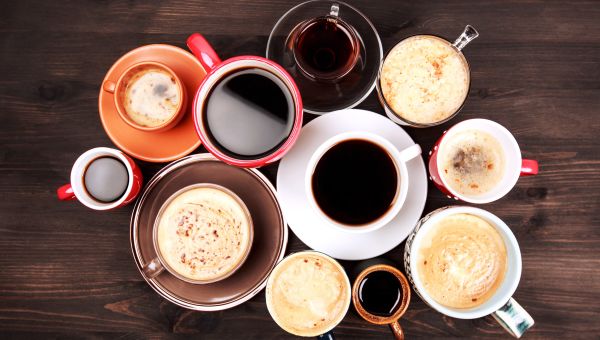
Eighty percent of adults in the United States consume caffeine every day, mostly in the form of caffeinated coffee and tea. The U.S. Food and Drug Administration (FDA) classifies caffeine as both a drug and a food additive, but what does that mean for your health?
While caffeine can help you through an afternoon slump, overdoing it can lead to health conditions like… Show More
Eighty percent of adults in the United States consume caffeine every day, mostly in the form of caffeinated coffee and tea. The U.S. Food and Drug Administration (FDA) classifies caffeine as both a drug and a food additive, but what does that mean for your health?
While caffeine can help you through an afternoon slump, overdoing it can lead to health conditions like heartburn, nervousness, dehydration and jitteriness, and more serious ones like anxiety, insomnia, heart attack and stroke. On the other hand, some studies show that regular, moderate coffee consumption could help protect against stroke and cardiovascular mortality.
We talked with Stefania Koziol, RD, lead dietitian at Swedish Medical Center in Denver, Colorado, to learn how much caffeine you may be consuming in beverages, foods and medications, plus ways to get more energy, naturally.
Show Less
How caffeine affects the body
Caffeine can be found in over 60 plants, including tea leaves and coffee beans. It’s also found in cacao, used to make chocolate, and kola nuts, used to flavor soda. Man-made caffeine may also be added to certain foods, drinks and medications.
The substance works to stimulate the central nervous… Show More
Caffeine can be found in over 60 plants, including tea leaves and coffee beans. It’s also found in cacao, used to make chocolate, and kola nuts, used to flavor soda. Man-made caffeine may also be added to certain foods, drinks and medications.
The substance works to stimulate the central nervous system—that part of your body that includes your brain, spinal cord and other nerves. Generally speaking, caffeine makes you feel alert and energized, helping to combat drowsiness. But it can also have other, less desirable side effects, depending on your age, sex, the medications you take and your genetics.
Show Less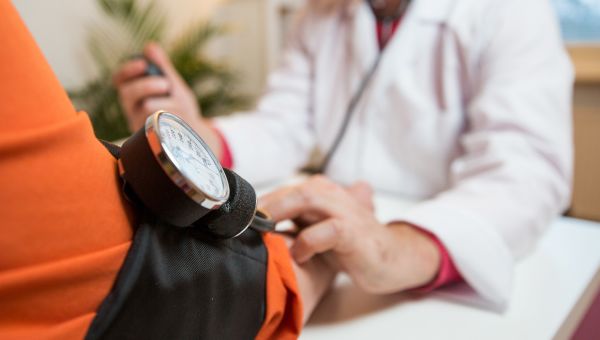
Health risks of too much caffeine
While caffeine can help you power through the day, there are some health risks involved with getting too much. The FDA says that for healthy adults, up to 400 milligrams per day is not normally associated with dangerous or negative effects. Overdoing it on caffeine can lead to including anxiety,… Show More
While caffeine can help you power through the day, there are some health risks involved with getting too much. The FDA says that for healthy adults, up to 400 milligrams per day is not normally associated with dangerous or negative effects. Overdoing it on caffeine can lead to including anxiety, insomnia, a rapid heartbeat, uneven heart rhythm, headaches, dizziness and dehydration. And for people who are more sensitive to caffeine, less than 400 milligrams may also bring about these symptoms.
In one extreme instance, a 16-year-old boy in South Carolina died after drinking a large diet Mountain Dew, a latte from McDonald’s and an energy drink, all within two hours of his death. Experts believe a caffeine overdose caused his arrhythmia, or abnormal heart beat, which proved fatal.
If you mix caffeine with other substances, it can cause high blood pressure and even a heart attack, says Koziol. If you consume caffeine with alcohol (think, rum and Coke), you may feel more alert, which can cause you to drink even more. This combo can lead to intoxication.
If you’re pregnant, stick to 200 milligrams or less a day.
Show Less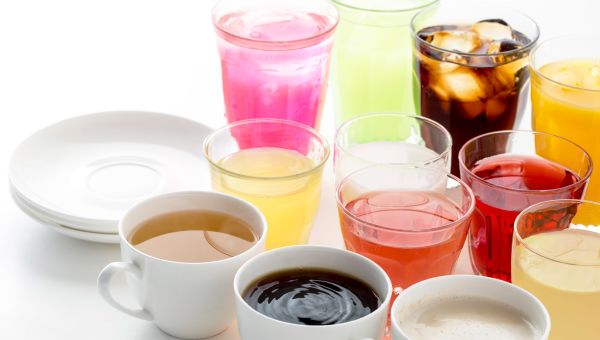
How much is in your beverage of choice?
Koziol says it’s all about moderation: barring a medical condition that would prevent you from drinking any caffeine, it’s usually safe when you stick to recommended amounts. If you’re drinking a variety of caffeinated beverages, you’ll need to keep track of the total amount. Here’s a breakdown of… Show More
Koziol says it’s all about moderation: barring a medical condition that would prevent you from drinking any caffeine, it’s usually safe when you stick to recommended amounts. If you’re drinking a variety of caffeinated beverages, you’ll need to keep track of the total amount. Here’s a breakdown of the amount in common caffeinated beverages:
- Teas: 40 to 120 mg per 8 ounces
- Coffee: 102 to 200 mg per 8 ounces
- Decaffeinated coffee: 5 mg per 8 ounces
- Espresso: 30 to 90 mg per ounce
- Regular and Diet Coke: 35 to 47 mg per 12 ounces
- Regular and Diet Mountain Dew: 54 mg per 12 ounces
- TAB: 47 mg per 12 ounces
- Regular and Sugar-Free Red Bull: 80 mg per 8.4 ounces
- 5-Hour Energy: 215 mg per two ounces
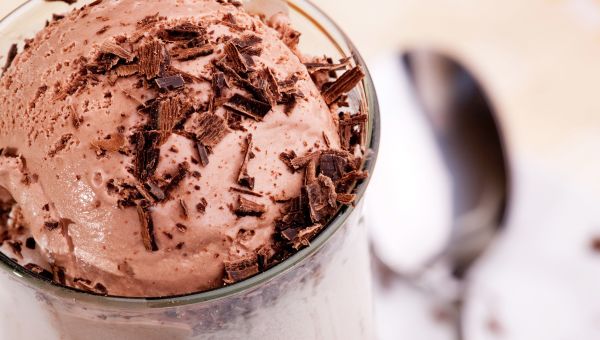
There’s caffeine in certain foods, too
You probably know that all forms of chocolate contain caffeine—9 Hershey’s kisses have 9 milligrams of caffeine—but you may not think about how much caffeine is in other foods, like granola bars and yogurt.
Koziol says to look for coffee or words like “mocha,” “java” or “energy bar” on food labels.… Show More
You probably know that all forms of chocolate contain caffeine—9 Hershey’s kisses have 9 milligrams of caffeine—but you may not think about how much caffeine is in other foods, like granola bars and yogurt.
Koziol says to look for coffee or words like “mocha,” “java” or “energy bar” on food labels. “A lot of frozen coffee-flavored yogurts, granola bars, ice creams and energy waters and gels have caffeine in them,” she says. You could easily down a lot of caffeine before bed without even knowing it.
While caffeine content varies in coffee and chocolate-flavored products, this list shows that foods you wouldn’t expect to have caffeine do:
- Ice creams and frozen yogurts: 30 to 45 milligrams
- Sugary cereals: up to 11 milligrams
- Puddings: up to 10 milligrams
While these foods alone probably aren’t going to cause problems, if you’re eating them along with drinking caffeinated beverages, you may exceed 400 milligrams per day.
Show Less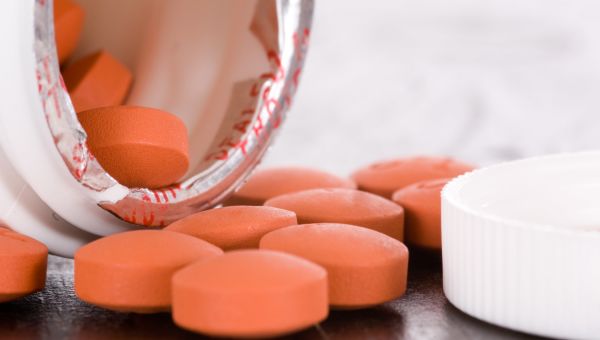
Medications with stimulants
You might be getting small amounts of caffeine in some of your medications, too. Some PMS drugs have caffeine (up to 60 milligrams) because caffeine is considered a diuretic, causing you to urinate; frequent urination can help reduce bloating. And because research shows that caffeine can help… Show More
You might be getting small amounts of caffeine in some of your medications, too. Some PMS drugs have caffeine (up to 60 milligrams) because caffeine is considered a diuretic, causing you to urinate; frequent urination can help reduce bloating. And because research shows that caffeine can help increase the effectiveness of aspirin and acetaminophen by 40 percent, caffeine is used in many common headache drugs.
Show Less
So, are you addicted to caffeine?
Without knowing it, you can build up a tolerance, or addiction, to caffeine. “It can create a vicious cycle,” says Koziol. “You’re not sleeping so you’re tired, then the next day you have more caffeine.” One way to know if you’re truly addicted is if you’ve tried to stop drinking caffeinated… Show More
Without knowing it, you can build up a tolerance, or addiction, to caffeine. “It can create a vicious cycle,” says Koziol. “You’re not sleeping so you’re tired, then the next day you have more caffeine.” One way to know if you’re truly addicted is if you’ve tried to stop drinking caffeinated beverages but can’t.
If you want to nix caffeine from your diet, don’t go cold turkey. Doing so could cause fatigue, depression, lack of focus and headaches—all signs of caffeine withdrawal syndrome. Withdrawal symptoms can last two to nine days after the last time you’ve consumed it.
Instead, gradually cut back on the amount you drink. Start substituting water or decaf options for some of your caffeinated beverages. If you often drink coffee or tea, one way to wean yourself off of it is to mix ½ decaf and ½ regular for a while before going completely decaf.
Show Less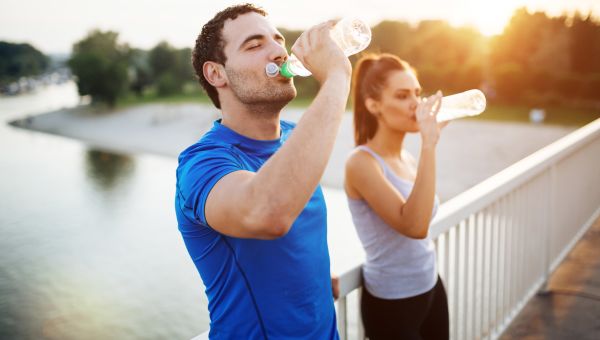
Natural ways to get more energy
Here are ways to boost your energy sans the double latte:
- Exercise: “You may think that you’re going to feel tired after exercising, but it actually energizes you,” says Koziol. The Centers for Disease Control and Prevention recommends that all adults get at least 150 minutes of moderate intensity … Show More
Here are ways to boost your energy sans the double latte:
- Exercise: “You may think that you’re going to feel tired after exercising, but it actually energizes you,” says Koziol. The Centers for Disease Control and Prevention recommends that all adults get at least 150 minutes of moderate intensity aerobic exercise like walking each week, or 75 minutes of high intensity aerobic exercise like running or swimming. In addition to boosting your energy levels, regular exercise can improve your mood, lower your risk of heart disease, help you maintain a healthy weight and help you get better sleep.
- Drink more water: Koziol says being dehydrated can make you feel tired, too—and drinking too much caffeine can contribute to dehydration. Make sure to drink a large glass of H20 with every meal. A good rule of thumb is eight, 8-ounce glasses of water per day. Here are some other ways you to make sure you drink enough fluids.
- Limit your intake of carbs: Simple carbs like breads, white rice, pasta and chips can make you feel sleepy. “You want to avoid foods like these that cause your energy levels to spike and then cause a lull afterwards,” says Koziol. Try complex carbs instead: whole wheat breads, brown rice, quinoa and whole wheat pasta are energy-saving choices.
More On


video

article

slideshow


video


video
